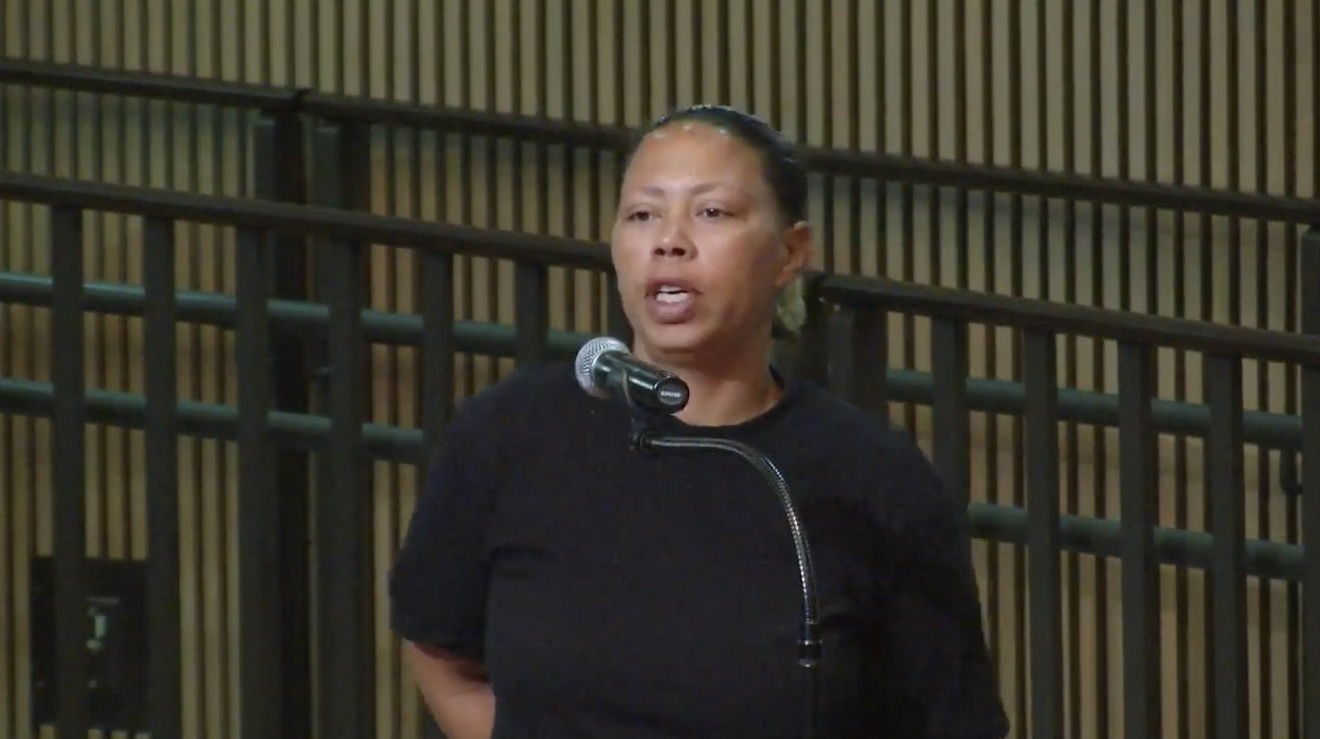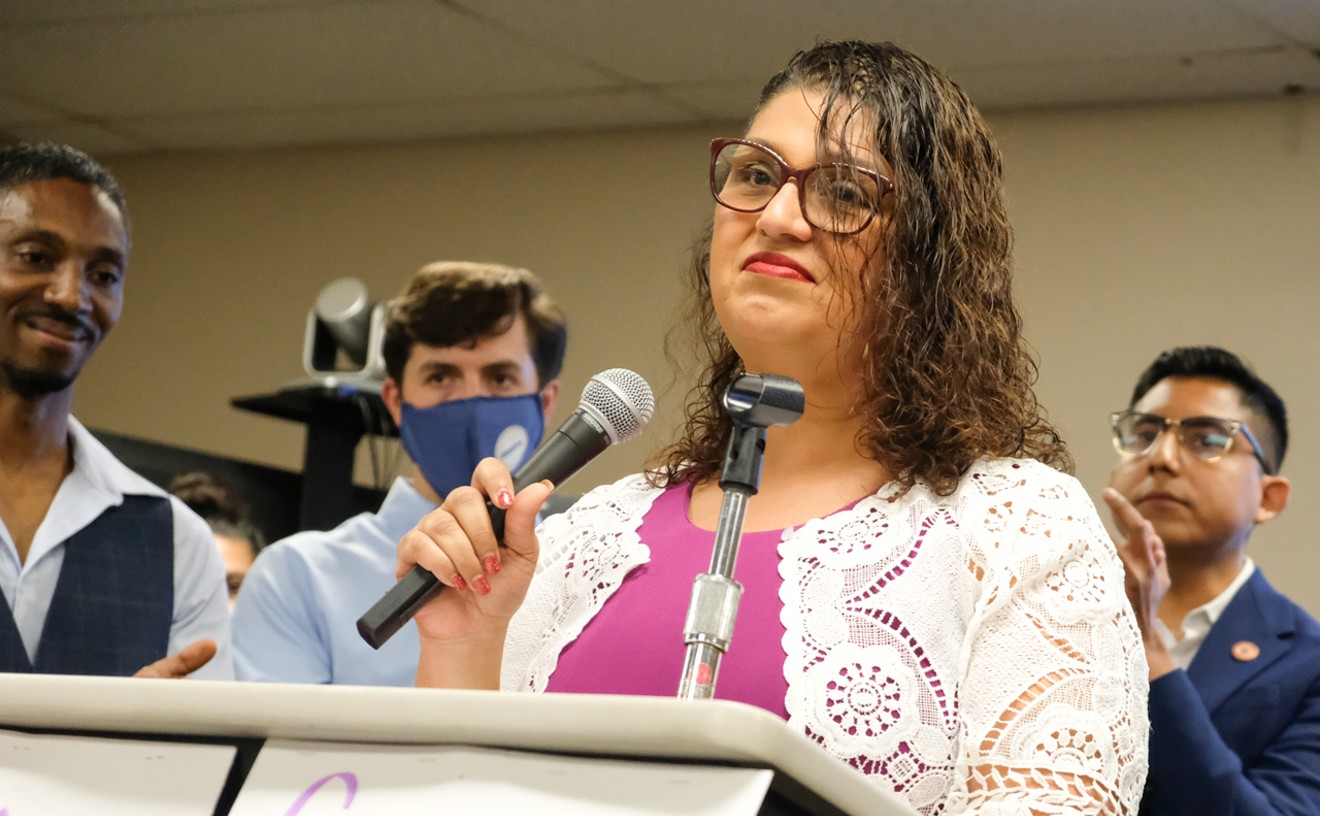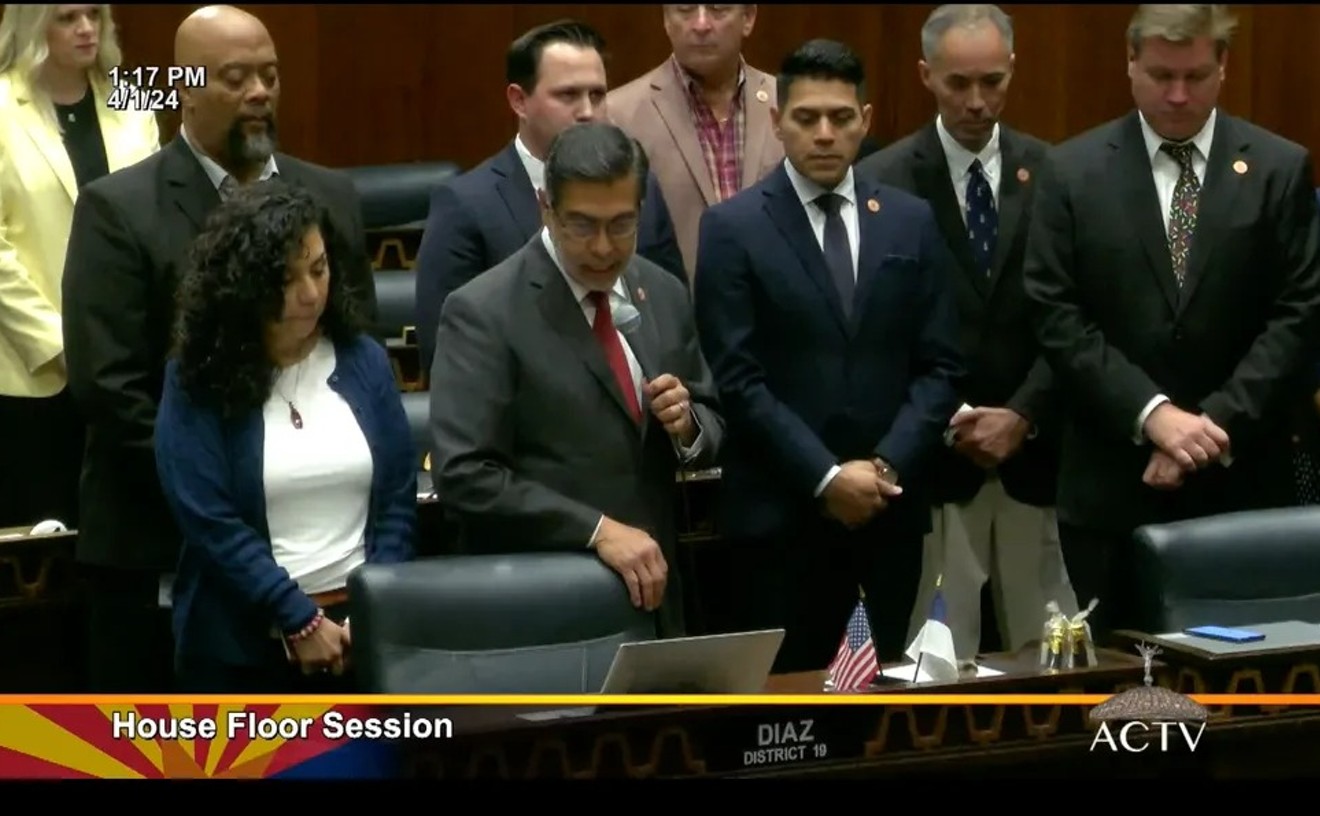Phoenix police officers allegedly conducted a warrantless body cavity search on a 37-year-old black mother, finding no evidence of illegal activity, before attempting to cover up the incident by refusing to document it or investigate her subsequent complaints, according to a legal claim filed on Monday.
Erica Reynolds is seeking $12.5 million in damages over the alleged invasive procedure, according to a notice of claim accusing police officers of sexual assault and battery, wrongful arrest, false imprisonment, gross negligence, and intentional infliction of emotional distress. The notice of claim, a precursor to a lawsuit, is addressed to Phoenix Mayor Kate Gallego, Police Chief Jeri Williams, and City Council members.
On top of the alleged cavity search and cover-up, Reynolds claims police arrested her again and coerced a confession out of her to prevent her from speaking out about the incident.
Reynolds' attorneys announced her legal action during a 10 a.m. press conference with her attorneys and supporters outside Phoenix City Hall. Reynolds did not speak or take questions.
It wasn't the first time Reynolds went public with her accusation against the police department. Before filing her notice of claim, Reynolds had accused the department of illegally searching her body in a January Facebook video and during a City Council meeting on June 18.
By deadline, the Phoenix Police Department did not respond to questions regarding the alleged cavity search of Reynolds.
The alleged incident — as told by attorneys Steve Benedetto and Heather Hamel — happened the day after Christmas. On December 26, 2018, Phoenix police officers pulled Reynolds over after surveilling a meeting she had with Charles Riggins, an alleged drug dealer.
Claiming to smell marijuana in Reynolds' car, the officers searched her vehicle. They found no drugs.
They patted Reynolds down. No drugs.
They brought out a drug-sniffing canine. No drugs.
"At this point, with Erica demonstrably not in possession of anything illegal, the Phoenix PD officers made a choice," the claim states. "They did not end the search. They did not secure a search warrant. They did not release Erica."
The officers brought Reynolds to the South Mountain substation and ordered her to strip naked in an interrogation room, she claims. They ordered her to bend over. As a female officer put on a pair of rubber gloves, Reynolds began to cry.
"As the officer inserted multiple unlubricated fingers into Erica’s anus, probing her rectum, the tears flowed," the claim states. "And as the officers aggressively poked and prodded a hemorrhoid, Erica yelped in pain."
The officer, without changing gloves, proceeded to search Reynolds' vagina. Neither cavity search turned up any drugs, according to Reynolds' claim.
The alleged search, as described in the claim, does not align with the best practices for such procedures promoted by the International Association of Chiefs of Police (IACP).
The organization calls for officers seeking to conduct a cavity search to first contact an immediate supervisor to determine whether there is probable cause to probe a suspect's body. Then, officers are instructed to obtain a search warrant. If a search warrant is granted, the IACP states that the procedure "shall be performed only by a physician or by other medically trained personnel at the physician's direction."
Phoenix police spokesperson Vincent Lewis said in an email, “As you are aware, we are unable to comment on pending litigation.”
A few years ago, a Phoenix PD spokesman said that officers never do this kind of body cavity search. The department denied at the time that it had any records whatsoever pertaining to any officer performing a cavity search.
"What you are describing would require a body cavity search warrant, and that would be served by a doctor," Sergeant Tommy Thompson said in 2013. "I actually authored one of those about 27 years ago. We don't go into body cavities ourselves."
In addition to the allegedly warrantless body cavity search, Reynolds also accused the department of covering up the incident by failing to document it, ignoring her official complaints, and arresting her to prevent her from speaking publicly about her encounter.
One attempt at a cover-up, Reynolds claims, occurred the same day as the search. After she was released by police that day, Reynolds went to Maricopa Medical Center with her daughter. According to her claim, she told hospital staff, “I think I was raped by police officers. They did a body cavity search and now I have bleeding.”
Per standard procedure, the emergency room staff called Phoenix Police to approve a rape kit examination. Phoenix Lieutenant J. Hester said the department would not investigate the allegation and refused to approve the rape kit, according to the claim.
Doctors conducted imaging studies on Reynolds and ruled out rectal or vaginal damage, but according to a snippet of her medical file included in the claim, doctors made a "final diagnostic impression" of "sexual assault" and "rectal bleeding."
Following her release from the hospital, the claim states, Reynolds filed a formal complaint with the Phoenix Police Department's Professional Standards Bureau, which investigates allegations of misconduct. She followed up multiple times with the bureau, but received no responses.
Frustrated by the inaction from the department, Reynolds first went public with her allegation on January 11, posting a video recounting her experience on Facebook. Community groups reached out to her in response to the video, and she got in touch with attorneys.
On January 23, court records show, Maricopa County prosecutors charged Riggins and 22 co-defendants with multiple drug crimes. Reynolds was not among those charges. Ten days later, Reynolds' attorneys requested all police reports from her December 26 detainment.
Meanwhile, the activist group Poder in Action started campaigning on behalf of Reynolds. The group posted a public Facebook event on February 2 calling for locals to show up at a City Council meeting to demand "#JusticeForErica." The group made another Facebook post on the day of the meeting, February 6, with the same hashtag.
Reynolds planned to attend the meeting, despite the fact that she was recovering from surgery she had the day before. Nevertheless, she did not show up.
According to the claim, she was picked up by Phoenix police on the morning of February 6 as she was out to get lunch, about three hours before she was supposed to speak before the City Council.
Police allegedly interrogated her for six hours. Through "duress, coercion, and subtle threats of traumatization," the claim states, officers elicited a statement from Reynolds that she had drugs in her vagina on December 26. However, if the statement is false because the officers found no drugs inside her body, it's unclear what good it would do for the prosecution's case.
Reynolds' attorneys heard she was arrested again from her daughter. When they called Phoenix police, officers denied that Reynolds was in their custody. Later on February 6, Hamel and Benedetto received another call from Reynolds' daughter saying her mother was at Maricopa Medical Center for post-surgery care. The attorneys went to the hospital. Two Phoenix officers were stationed outside Reynolds' hospital room.
After Reynolds met with her attorneys, Phoenix officers transported her to the Maricopa County jail on Fourth Avenue, where she was booked on four felony counts related to Riggins' alleged drug ring.
Maricopa County prosecutors have not charged Reynolds with any crimes stemming from her February 6 arrest.
During Reynolds' initial court appearance, her attorneys received a probable cause statement from police detailing multiple alleged phone calls between her and Riggins discussing illegal drugs.
But the probable cause statement, released to the media, does not offer many details about her December 26 detainment. Police claim in the document that Reynolds arranged on the phone to meet with Riggins.
"Erica is seen arriving to meet Riggins a short while later," the document states. "She leaves. A traffic stop was conducted. A search was conducted on Erica but no product was found." The narrative continues to say that police intercepted a subsequent call from Reynolds to Riggins in which she allegedly said she "stuffed that shit."
The statement makes no mention of the alleged body cavity search.
Reynolds' attorneys said that after her February 6 arrest, they "vigorously" followed up on public records requests for police reports related to the alleged body cavity search and detainment on the day after Christmas in 2018. They finally received a response saying no record of the December 26 body cavity search existed.
"A warrantless body cavity search, in a police substation, by a police officer, following an unlawful arrest. A refusal to investigate the victim’s complaints of assault," the claim states. "And now a refusal to even document the interaction?"
Reynolds and her supporters are calling for the Phoenix Police Department to adopt a policy for body cavity searches, as well as a civilian review board with subpoena power.
The notice of claim, filed on the last possible day before deadline, comes as the Phoenix Police Department faces national criticism for an incident in which officers held a black family at gunpoint and threatened to shoot them after a 4-year-old walked out of a dollar store with a doll.
The incident prompted Phoenix Mayor Gallego to call a community meeting, in which dozens of residents spoke about their own negative encounters with police. During the meeting, Paris Wallace, a community organizer with Poder in Action, identified herself as Reynolds' friend and brought up the alleged cavity search.
"This woman, her whole life has been ruined because of a sexual assault," Wallace said. "When you look up the definition of an unwanted, unwarranted, unsanctioned cavity search of one's body by an unauthorized person, that is a sexual assault."
[
{
"name": "Air - MediumRectangle - Inline Content - Mobile Display Size",
"component": "18478561",
"insertPoint": "2",
"requiredCountToDisplay": "2"
},{
"name": "Editor Picks",
"component": "16759093",
"insertPoint": "4",
"requiredCountToDisplay": "1"
},{
"name": "Inline Links",
"component": "17980324",
"insertPoint": "8th",
"startingPoint": 8,
"requiredCountToDisplay": "7",
"maxInsertions": 25
},{
"name": "Air - MediumRectangle - Combo - Inline Content",
"component": "16759092",
"insertPoint": "8th",
"startingPoint": 8,
"requiredCountToDisplay": "7",
"maxInsertions": 25
},{
"name": "Inline Links",
"component": "17980324",
"insertPoint": "8th",
"startingPoint": 12,
"requiredCountToDisplay": "11",
"maxInsertions": 24
},{
"name": "Air - Leaderboard Tower - Combo - Inline Content",
"component": "16759094",
"insertPoint": "8th",
"startingPoint": 12,
"requiredCountToDisplay": "11",
"maxInsertions": 24
}
]











